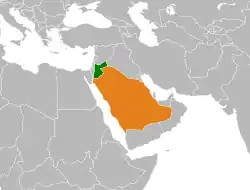Jordan–Saudi Arabia relations
Jordan and Saudi Arabia are both Sunni monarchies. Historically, the Hashemite dynasty came to Jordan from the Hijaz, which is now part of Saudi Arabia. The Hashemites ruled Mecca from 1916 until 1924, when the House of Saud annexed the area in the Saudi conquest of Hejaz.

 | |
Jordan |
Saudi Arabia |
|---|---|
| Diplomatic mission | |
| Embassy of Jordan, Riyadh, Saudi Arabia | Embassy of Saudi Arabia, Amman, Jordan |
| Envoy | |
| Ambassador of Jordan to Saudi Arabia: | Ambassador of Saudi Arabia to Jordan Nayef bin Bandar Al Sudairi |
The two cities of Aqaba and Ma'an were part of the Kingdom of Hejaz (1916–1925). In May 1925, Ibn Saud gave up the Aqaba and Ma’an districts of the Hejaz and it became part of British Emirate of Transjordan.[1] In 1965, Saudi Arabia and Jordan agreed to trade land, thus finalising the Jordan–Saudi Arabia border. Jordan gained 19 kilometers of land on the Gulf of Aqaba and 6,000 square kilometers of territory in the interior, and 7,000 square kilometers of Jordanian-administered, landlocked territory was ceded to Saudi Arabia.[2]
According to a 2013 Pew global opinion poll, 88% of Jordanians express a favourable view of Saudi Arabia, with 11% expressing an unfavourable view, the most favourable opinion of the Saudi Arabia in the Middle East.[3]
After the elevation of Mohammed bin Salman to Saudi Crown Prince, relations have deteriorated over Saudi attempts to sideline Jordan in negotiations over the Israeli–Palestinian conflict, Jordan's reluctant support of Saudi Arabia during the 2017–18 Qatar diplomatic crisis and limited involvement in the Saudi-led intervention in Yemen, and growing Jordanian ties with Turkey.[4][5]
Saudi Arabia concluded an agreement with Jordan to provide assistance and support to the educational sector for $50 million.[6]
On 22 June 2022, Abdullah II of Jordan met with Saudi Arabian Crown Prince Mohammed bin Salman. They discussed bilateral relations, investment plans and Joe Biden's Middle East visit in July.[7][8][9]
References
- "Jordan - History - the Making of Transjordan".
- "International Boundary Study, No. 60 – December 30, 1965, Jordan – Saudi Arabia Boundary" (PDF). US Department of State. Retrieved 30 January 2019.
- Saudi Arabia’s Image Falters among Middle East Neighbors Pew Research Global Attitudes Project
- "Saudi Arabia is Playing Political Hardball, But Jordan Stands in the Way". 20 February 2018.
- "Qatar and Jordan Seek a Broader Consensus in Washington". 21 February 2018.
- "Saudi fund signs Jordanian schools agreement". Arab News. 6 July 2019. Retrieved 10 July 2019.
- "Saudi Crown Prince heads to Jordan after Egypt as regional tour continues". The Siasat Daily. 22 June 2022. Retrieved 27 June 2022.
- Al-Khalidi, Suleiman (21 June 2022). "Saudi crown prince visits Jordan in thaw of ties, raising hope for new investments -officials". Reuters. Retrieved 27 June 2022.
- "Saudi Crown Prince MBS arrives in Jordan on regional visit". www.aljazeera.com. Retrieved 27 June 2022.
